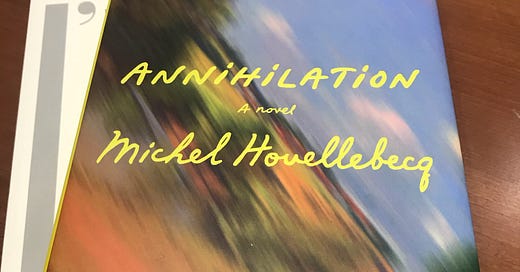I recently reviewed Michel Houellebecq’s Annihilation for Compact. In my review, I try to bring out the religious concerns in Houellebecq’s recent fiction. This left me with no room left over to mention what Houellebecq says about Girard in the novel.
“The philosopher René Girard,” he writes on page 335 of Annihilation, “is known for his theory of mimetic desire, or triangular desire, according to which one desires what others desire, by imitation. Amusing on paper, the theory is in fact false. People are more or less indifferent to the desires of others, and they are unanimous in desiring the same things and the same beings, just because those things are inherently desirable.”
The context for this theoretical aside is a passage about the most odious character in Annihilation, who has just argued violently with her husband, having guessed somehow that he is having a relationship with another woman. The novelist continues:
Likewise, the fact that another woman desired Aurélien did not lead Indy to desire him in turn. Instead, she was furious, almost mad with rage, at the idea that Aurélien might desire another woman and not desire her; for a long time, perhaps, the narcissistic stimuli based on competition and hatred had taken over within her from sexual stimuli; and they were, in principle, boundless.
Houellebecq’s grasp of Girard’s theory is plainly lacking (or maybe it’s just deliberately and provocatively obtuse). He fails to see that for Girard “desire” means more than just sexual desire, while competition is itself mimetic.
But maybe that’s not so serious, at least where his task as a novelist is concerned. I mean that in this case he doesn’t have to “get” Girard fully for his incomplete understanding to inform what he’s saying about his characters. Houellebecq wants to say that Indy’s tendency to hate has strengthened over time to the point of suppressing in her the more human impulses of jealousy and sexual desire that might have entitled her to our sympathy. Once a softer, less loathsome creature, she has become a rage-driven virago who, we suspect, will stop at nothing to exact revenge, and whom Houellebecq seemingly wants us to dislike.
The reference to Girard, in other words, however uncomplimentary, works much as a reference to animal magnetism might work in a Balzac novel—as a ready-at-hand instrument for revealing character. Though it fails to say much about Girard and his theory, it contributes to revealing something about Indy and her relationship with Aurélien.
On a deeper level, Houellebecq’s dismissal of Girard may say something about Annihilation as a whole. The novel goes out of its way to avoid creating dramatic tension. It barely touches upon adultery and sexual jealousy, two traditional themes of the European novel that, in all fairness, Houellebecq has never showed much interest in addressing, maybe because both imply the existence of bourgeois limits that in the world of his fiction have been mostly swept away.
Instead, Annihilation shows us reasonably stable, loving couples (Indy and Aurélien are the exception) struggling together against external forces—grave illness, unemployment, the French public healthcare system, shadowy terrorists, electoral rivals, even “Western nihilism.”
Girard thought that “internal mediation”—competition—was the essence of the modern world. And that at their best, nineteenth- and twentieth-century novels by the likes of Stendhal and Proust revealed it. Houellebecq seems intent on showing that the twenty-first-century novel can get away with ignoring it.





Just read your review in Compact - love it. Reading Houellbeq (I just now forgot how to spell his name - middle age strikes again) as a Catholic is the only way to read Houellbeq. If you read him & don't immediately covert to Catholicism, what are you even thinking? Lol
Is it more a literary device than the author’s view? The character doesn’t understand Girard, but isn’t that the whole point?